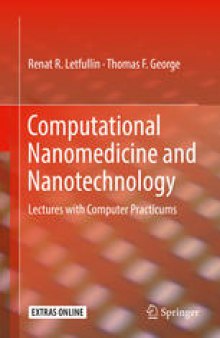 جزییات کتاب
جزییات کتاب
This textbook, aimed at advanced undergraduate and graduate students, introduces the basic knowledge required for nanomedicine and nanotechnology, and emphasizes how the combined use of chemistry and light with nanoparticles can serve as treatments and therapies for cancer. This includes nanodevices, nanophototherapies, nanodrug design, and laser heating of nanoparticles and cell organelles. In addition, the book covers the emerging fields of nanophotonics and nanoplasmonics, which deal with nanoscale confinement of radiation and optical interactions on a scale much smaller than the wavelength of the light. The applications of nanophotonics and nanoplasmonics to biomedical research discussed in the book range from optical biosensing to photodynamic therapies.Cutting-edge and reflective of the multidisciplinary nature of nanomedicine, this book effectively combines knowledge and modeling from nanoscience, medicine, biotechnology, physics, optics, engineering, and pharmacy in an easily digestible format. Among the topics covered in-depth are:• The structure of cancer cells and their properties, as well as techniques for selective targeting of cancer and gene therapy.• Nanoplasmonics: Lorentz-Mie simulations of optical properties of nanoparticles and the use of plasmonic nanoparticles in diagnosis and therapy.• Nanophotonics: short and ultrashort laser pulse interactions with nanostructures, time and space simulations of thermal fields in and around the nanobioparticles, and nanoclusters heated by radiation.• Modeling of soft and hard biological tissue ablation by activated nanoparticles, as well as optical, thermal, kinetic, and dynamic modeling.• Detection techniques, including the design and methods of activation of nanodrugs and plasmon resonance detection techniques.• Design and fabrication of nanorobots and nanoparticles.• Effective implementation of nanotherapy treatments.• Nanoheat transfer, particularly the heating and cooling kinetics of nanoparticles.• …and more!Each chapter contains a set of lectures in the form of text for student readers and PowerPoints for use by instructors, as well as homework exercises. Selected chapters also contain computer practicums, including Maple codes and worked-out examples. This book helps readers become more knowledgeable and versant in nanomedicine and nanotechnology, inspires readers to work creatively and go beyond the ideas and topics presented within, and is sufficiently comprehensive to be of value to research scientists as well as students.



 دانلود کتاب
دانلود کتاب

 جزییات کتاب
جزییات کتاب





 این کتاب رو مطالعه کردید؟ نظر شما چیست؟
این کتاب رو مطالعه کردید؟ نظر شما چیست؟
